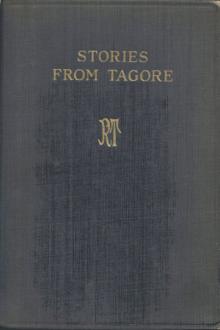The Home and the World - Rabindranath Tagore (books to read in your 30s .txt) 📗

- Author: Rabindranath Tagore
- Performer: -
Book online «The Home and the World - Rabindranath Tagore (books to read in your 30s .txt) 📗». Author Rabindranath Tagore
taste of that pure emptiness--one can see it in his face, which
pains even me. But it was Nikhil's boast that he wanted the
Truth, while mine was that I would never let go illusion from my
grasp. Each has been suited to his taste, so why complain?
To keep Bimala's heart in the rarefied air of idealism, I cut
short all further discussion over the five thousand rupees. I
reverted to the demon-destroying goddess and her worship. When
was the ceremony to be held and where? There is a great annual
fair at Ruimari, within Nikhil's estates, where hundreds of
thousands of pilgrims assemble. That would be a grand place to
inaugurate the worship of our goddess!
Bimala waxed intensely enthusiastic. This was not the burning of
foreign cloth or the people's granaries, so even Nikhil could
have no objection--so thought she. But I smiled inwardly. How
little these two persons, who have been together, day and night,
for nine whole years, know of each other! They know something
perhaps of their home life, but when it comes to outside concerns
they are entirely at sea. They had cherished the belief that the
harmony of the home with the outside was perfect. Today they
realize to their cost that it is too late to repair their neglect
of years, and seek to harmonize them now.
What does it matter? Let those who have made the mistake learn
their error by knocking against the world. Why need I bother
about their plight? For the present I find it wearisome to keep
Bimala soaring much longer, like a captive balloon, in regions
ethereal. I had better get quite through with the matter in
hand.
When Bimala rose to depart and had neared the door I remarked in
my most casual manner: "So, about the money ..."
Bimala halted and faced back as she said: "On the expiry of the
month, when our personal allowances become due ..."
"That, I am afraid, would be much too late."
"When do you want it then?"
"Tomorrow.
"Tomorrow you shall have it."
A line from Bankim Chatterjee's national song _BandeMataram_.
A quotation from the Upanishads.
There is a world of sentiment attached to the ornaments worn
by women in Bengal.
They are not merely indicative of the love and regard of the
giver, but the wearing of them symbolizes all that is held best
in wifehood--the constant solicitude for her husband's welfare,
the successful performance of the material and spiritual duties
of the household entrusted to her care. When the husband dies,
and the responsibility for the household changes hands, then are
all ornaments cast aside as a sign of the widow's renunciation of
worldly concerns. At any other time the giving up of omaments is
always a sign of supreme distress and as such appeals acutely to
the sense of chivalry of any Bengali who may happen to witness it
[Trans.].
Chapter Eight
Nikhil's Story
X
PARAGRAPHS and letters against me have begun to come out in the
local papers; cartoons and lampoons are to follow, I am told.
Jets of wit and humour are being splashed about, and the lies
thus scattered are convulsing the whole country. They know that
the monopoly of mud-throwing is theirs, and the innocent passer-
by cannot escape unsoiled.
They are saying that the residents in my estates, from the
highest to the lowest, are in favour of Swadeshi, but they
dare not declare themselves, for fear of me. The few who have
been brave enough to defy me have felt the full rigour of my
persecution. I am in secret league with the police, and in
private communication with the magistrate, and these frantic
efforts of mine to add a foreign title of my own earning to the
one I have inherited, will not, it is opined, go in vain.
On the other hand, the papers are full of praise for those
devoted sons of the motherland, the Kundu and the Chakravarti
zamindars. If only, say they, the country had a few more
of such staunch patriots, the mills of Manchester would have, had
to sound their own dirge to the tune of Bande Mataram.
Then comes a letter in blood-red ink, giving a list of the
traitorous zamindars whose treasuries have been burnt down
because of their failing to support the Cause. Holy Fire, it
goes on to say, has been aroused to its sacred function of
purifying the country; and other agencies are also at work to see
that those who are not true sons of the motherland do cease to
encumber her lap. The signature is an obvious _nom-de-
plume_.
I could see that this was the doing of our local students. So I
sent for some of them and showed them the letter.
The B.A. student gravely informed me that they also had heard
that a band of desperate patriots had been formed who would stick
at nothing in order to clear away all obstacles to the success of
Swadeshi.
"If," said I, "even one of our countrymen succumbs to these
overbearing desperadoes, that will indeed be a defeat for the
country!"
"We fail to follow you, Maharaja," said the history student.
"'Our country," I tried to explain, "has been brought to death's
door through sheer fear--from fear of the gods down to fear of
the police; and if you set up, in the name of freedom, the fear
of some other bogey, whatever it may be called; if you would
raise your victorious standard on the cowardice of the country by
means of downright oppression, then no true lover of the country
can bow to your decision."
"Is there any country, sir," pursued the history student, "where
submission to Government is not due to fear?"
"The freedom that exists in any country," I replied, "may be
measured by the extent of this reign of fear. Where its threat
is confined to those who would hurt or plunder, there the
Government may claim to have freed man from the violence of man.
But if fear is to regulate how people are to dress, where they
shall trade, or what they must eat, then is man's freedom of will
utterly ignored, and manhood destroyed at the root."
"Is not such coercion of the individual will seen in other
countries too?" continued the history student.
"Who denies it?" I exclaimed. "But in every country man has
destroyed himself to the extent that he has permitted slavery to
flourish."
"Does it not rather show," interposed a Master of Arts, "that
trading in slavery is inherent in man--a fundamental fact of his
nature?"
"Sandip Babu made the whole thing clear," said a graduate. "He
gave us the example of Harish Kundu, your neighbouring
zamindar. From his estates you cannot ferret out a single
ounce of foreign salt. Why? Because he has always ruled with an
iron hand. In the case of those who are slaves by nature, the
lack of a strong master is the greatest of all calamities."
"Why, sir!" chimed in an undergraduate, "have you not heard of
the obstreperous tenant of Chakravarti, the other zamindar
close by--how the law was set on him till he was reduced to utter
destitution? When at last he was left with nothing to eat, he
started out to sell his wife's silver ornaments, but no one dared
buy them. Then Chakravarti's manager offered him five rupees for
the lot. They were worth over thirty, but he had to accept or
starve. After taking over the bundle from him the manager coolly
said that those five rupees would be credited towards his rent!
We felt like having nothing more to do with Chakravarti or his
manager after that, but Sandip Babu told us that if we threw over
all the live people, we should have only dead bodies from the
burning-grounds to carry on the work with! These live men, he
pointed out, know what they want and how to get it--they are born
rulers. Those who do not know how to desire for themselves, must
live in accordance with, or die by virtue of, the desires of such
as these. Sandip Babu contrasted them--Kundu and Chakravarti--
with you, Maharaja. You, he said, for all your good intentions,
will never succeed in planting Swadeshi within your
territory."
"It is my desire," I said, "to plant something greater than
Swadeshi. I am not after dead logs but living trees--and
these will take time to grow."
"I am afraid, sir," sneered the history student, "that you will
get neither log nor tree. Sandip Babu rightly teaches that in
order to get, you must snatch. This is taking all of us some
time to learn, because it runs counter to what we were taught at
school. I have seen with my own eyes that when a rent-collector
of Harish Kundu's found one of the tenants with nothing which
could be sold up to pay his rent, he was made to sell his young
wife! Buyers were not wanting, and the zamindar's demand
was satisfied. I tell you, sir, the sight of that man's distress
prevented my getting sleep for nights together! But, feel it as
I did, this much I realized, that the man who knows how to get
the money he is out for, even by selling up his debtor's wife, is
a better man than I am. I confess it is beyond me--I am a
weakling, my eyes fill with tears. If anybody can save our
country it is these Kundus and these Chakravartis and their
officials!"
I was shocked beyond words. "If what you say be true," I cried,
"I clearly see that it must be the one endeavour of my life to
save the country from these same Kundus and Chakravartis and
officials. The slavery that has entered into our very bones is
breaking out, at this opportunity, as ghastly tyranny. You have
been so used to submit to domination through fear, you have come
to believe that to make others submit is a kind of religion. My
fight shall be against this weakness, this atrocious cruelty!"
These things, which are so simple to ordinary folk, get so
twisted in the minds of our B.A.'s and M.A.'s, the only purpose
of whose historical quibbles seems to be to torture the truth!
XI
I am worried over Panchu's sham aunt. It will be difficult to
disprove her, for though witnesses of a real event may be few or
even wanting, innumerable proofs of a thing that has not happened
can always be marshalled. The object of this move is, evidently,
to get the sale of Panchu's holding to me set aside. Being
unable to find any other way out of it, I was thinking of
allowing Panchu to hold a permanent tenure in my estates and
building him a cottage on it. But my master would not have it.
I should not give in to these nefarious tactics so easily, he
objected, and offered to attend to the matter himself.
"You, sir!" I cried, considerably surprised.
"Yes, I," he repeated.
I could not see, at all clearly, what my master could do to
counteract these legal machinations. That evening, at the time
he usually came to me, he did not turn up. On my making
inquiries, his servant said he had left home with a few things
packed in a small trunk, and some bedding, saying he would





Comments (0)